We may not have the course you’re looking for. If you enquire or give us a call on +64 98874342 and speak to our training experts, we may still be able to help with your training requirements.
Training Outcomes Within Your Budget!
We ensure quality, budget-alignment, and timely delivery by our expert instructors.
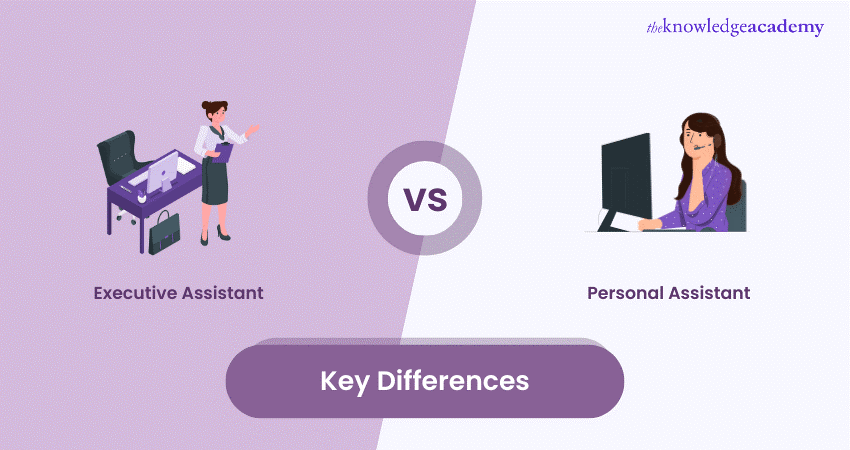
Explore the nuanced differences between Executive Assistants vs Personal Assistants (PAs). These roles play pivotal parts in organisational efficiency, but their unique attributes are key to success.
In this blog, you will learn the intricacies, including how Executive Assistants offer professional assistance to high-level professionals while Personal Assistants manage both professional and personal.
Table of Contents
1) What is an Executive Assistant?
2) What is a Personal Assistant?
3) Executive Assistant vs Personal Assistant: What’s the Difference?
4) How to choose between Executive Assistant and Personal Assistant?
5) Conclusion
What is an Executive Assistant?
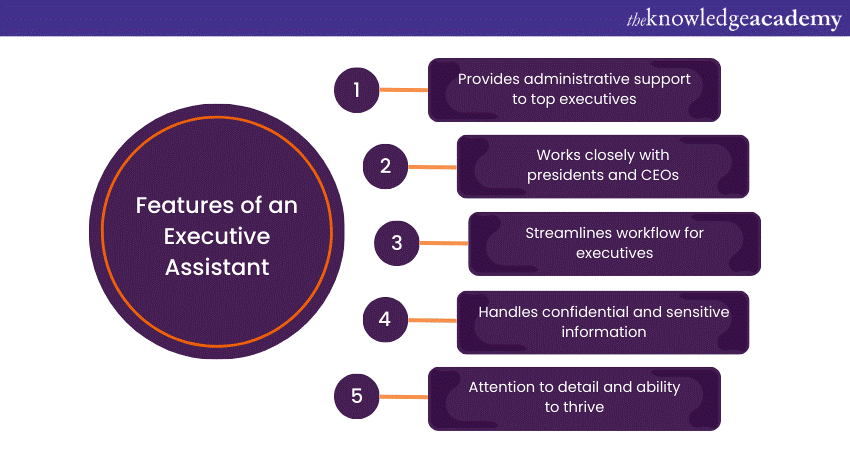
An Executive Assistant (EA) provides high-level administrative support to top executives, such as CEOs and presidents, enhancing organisational efficiency and managing the details of their professional lives. Key responsibilities include managing calendars, coordinating meetings, making travel arrangements, and handling confidential information with discretion.
EAs anticipate executives' needs, address challenges, and facilitate communication across departments. Essential traits include exceptional organisational skills, attention to detail, and the ability to thrive in fast-paced environments. They play a crucial role in supporting leadership and contributing to the organisation's success.
Benefits of Becoming an Executive Assistant
The Executive Assistant (EA) has a vast scope in today’s job market. Below are some of the benefits of why you should choose it as a profession:
a) Improved Time Management:
Executive Assistants are proactive in managing their employer's tasks, saving them significant time. They handle repetitive tasks such as paperwork, scheduling, budgeting, and phone calls with efficiency and speed.
b) Higher Productivity:
Executive Assistants attend meetings on their employer’s behalf. This helps the employer focus on productive tasks, resulting in profits.
c) Enhanced Professional Image:
Executive Assistants play a crucial role in maintaining their employer's professional image. They handle tasks such as sending thank you cards, nurturing relationships, and ensuring bills are paid on time, all of which contribute to a positive public perception.
d) Reduced Time Demands:
An Executive Assistant can keep their employer on schedule by keeping track of their appointments and allowing for unexpected delays. They also keeps track of recurring appointments, tentative meetings, etc.
e) Loyal Support:
They provide consistent support on your worst days by staying at your side to understand your daily schedule and handle the immediate tasks.
Eager to crack your interview for a personal assistanyt role, refer to our blog on "Personal Assistant Interview Questions"
Skillsets of an Executive Assistant
An Executive Assistant is expected to possess the following skills to be successful in their contribution to an organisation. Have a look below:
a) Organisational Skills: Proficiency in managing complex calendars, schedules, and priorities is essential.
b) Communication: Strong verbal and written communication skills are necessary for effective interaction with executives and stakeholders.
c) Multitasking: The ability to handle multiple tasks simultaneously and prioritise efficiently is crucial.
d) Discretion: Maintaining confidentiality and handling sensitive information with the utmost discretion is imperative.
e) Problem-solving: Quick and strategic thinking is required to address challenges and unforeseen issues.
f) Tech Proficiency: High proficiency in office tools and technology is important.
g) Adaptability: Thriving in fast-paced environments and adjusting to changing priorities is key.
h) Attention to Detail: Meticulously handling details to ensure accuracy and precision in tasks is vital.
What is a Personal Assistant?
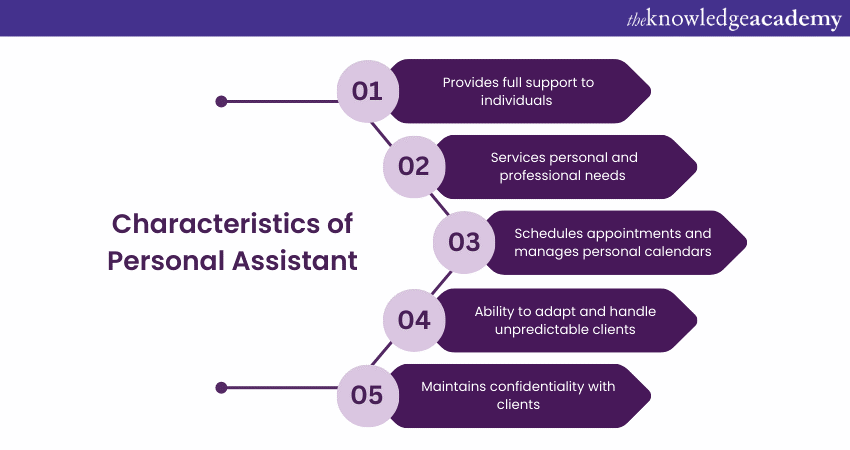
A Personal Assistant (PA) provides comprehensive support to individuals, focusing on both personal and professional tasks. Unlike Executive Assistants, who work in the corporate world, PAs work privately with individuals to manage daily life and commitments.
Responsibilities include scheduling appointments, managing diaries, handling correspondence, and organising travel for business and leisure. PAs also manage household affairs, coordinate family schedules, and oversee personal projects.
A successful PA possesses strong organisational skills, discretion, and adaptability, as well as the ability to maintain confidentiality and strong interpersonal relationships. They act as trusted allies, streamlining daily affairs and enhancing overall efficiency.
Benefits of Becoming a Personal Assistant
Let’s now look at the benefits on why you should opt for the Personal Assistant (PA) as the profession:
a) Improved Productivity:
Like Executive Assistants, they also streamline tasks and manage responsibilities to allow the employer to focus on high-priority tasks. These include scheduling appointments, managing emails, organising travel arrangements, and coordinating meetings.
b) Optimising Time:
Personal Assistants are proficient in time management. They ensure that employer tasks are completed within deadlines. By allotting time-consuming and repetitive tasks, employers can focus on the tasks that require their unique expertise.
c) Stress Reduction:
A Personal Assistant acts as a buffer by shielding the employer from the stresses and chores of daily life. This enables them to approach their work and personal lives with better mental clarity and a renewed sense of purpose.
d) Skill Diversification:
A Personal Assistant can handle a wide array of tasks, from managing social media accounts to conducting research, coordinating events, and handling personal matters.
e) Strategic Focus:
A Personal Assistant can assist in handling operational details, allowing the employer to focus on larger strategic goals and growth-oriented initiatives.
Skillsets of a Personal Assistant
A Personal Assistant is expected to possess the following skills to be successful in their contribution to an organisation. Have a look below
a) Discretion and Confidentiality: Upholding a high level of discretion in managing personal matters is essential.
b) Adaptability: Flexibility is crucial to cater to the dynamic and varied needs of the individual.
c) Time Management: Efficiently organising personal schedules and tasks is necessary.
d) Communication: Clear and open communication is needed to understand and meet personal preferences.
e) Networking: Building personal relationships and networking skills is important.
f) Detail-oriented: Being attentive to details in managing both professional and personal affairs is vital.
g) Tech Proficiency: Utilising technology for personal scheduling and communication is key.
h) Problem-solving: Effectively addressing personal challenges and managing diverse responsibilities is required.
Executive Assistant vs Personal Assistant: What’s the Difference?
Here is a table describing the differences between an Executive Assistant and a Personal Assistant. Have a look below:
|
Criteria |
Executive Assistant (EA) |
Personal Assistant (PA) |
|
Primary focus |
Works in a professional/corporate setting, providing support to top-level executives.
|
Primarily caters to the personal needs of an individual, often outside the corporate environment. |
|
Responsibilities |
Calendar management for executives Travel arrangements and itineraries Handling sensitive and confidential information Project management and coordination Liaison between executive and other departments
|
Personal scheduling and appointments Managing household affairs Handling personal correspondence Travel arrangements for personal trips Assistance with personal errands |
|
Scope of work |
High-level and strategic tasks related to the executive's professional responsibilities. |
Diverse tasks ranging from professional to personal, covering various aspects of an individual's life. |
|
Skill sets |
Strong organisational and multitasking skills Excellent communication and interpersonal skills Strategic thinker and problem-solving abilities High-level proficiency in office tools and technology Ability to work under pressure and tight deadlines |
Discretion and able to keep information confidential of their employer Flexibility and adaptability to personal needs Attention to detail in personal matters Strong time management for both professional and personal tasks Personal relationship building and networking skills |
|
Challenges |
Balancing multiple priorities and demands Navigating complex organisational structures Handling high-stakes and time-sensitive tasks |
Maintaining boundaries between personal and professional life Juggling diverse personal responsibilities Adapting to the dynamic nature of personal needs and preferences |
|
Collaboration and communication |
Collaborating with other high-level executives and departments Effective communication to ensure seamless operations Building relationships to enhance the executive's network |
Communicating closely with the individual they support Understanding personal preferences and adapting accordingly Ensuring clear and open communication in personal matters |
|
Professional environment |
Typically operates within a corporate or organisational setting. |
May work in various settings, including private residences, supporting individuals in a personal capacity. |
|
Decision-making authority |
Often involved in decision-making processes related to executive's schedule and tasks. |
Decision-making may be more personal and related to managing the individual's personal life. |
|
Networking |
Involves networking within the corporate environment to enhance the executive's professional connections. |
Networking may be more personal, focusing on building relationships for the individual in their personal life. |
|
Overall role |
Enhances the efficiency and effectiveness of top-level executives in a corporate setting. |
Provides comprehensive support to individuals, managing both professional and personal aspects of their lives. |
How to Choose Between Executive Assistant and Personal Assistant?
Choosing between an Executive Assistant (EA) and a Personal Assistant (PA) depends on the unique needs and dynamics of the organisation or individual. Both roles are integral to the smooth functioning of professional and personal spheres, respectively.
To make the right decision, it's important to consider several key factors, including job responsibilities, work environment and schedule, career development opportunities, and organisational culture.
Here are the various facets to consider when deciding between an Executive Assistant vs Personal Assistant:
1) Job responsibilities
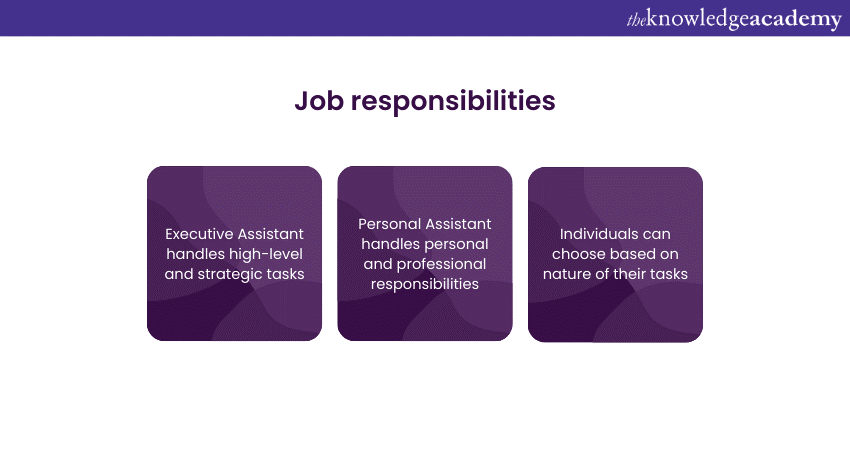
Executive Assistant (EA): Executive Assistants (EA) primarily handle high-level and strategic tasks related to their executives. Their responsibilities often include calendar management, travel arrangements, handling confidential information, and project management.
They also serve as a liaison between the executive and other departments. EAs contribute to the executive's effectiveness by managing complex schedules, coordinating meetings, and ensuring seamless communication.
Personal Assistant (PA): Personal Assistants (PA), on the other hand, take on a broader range of responsibilities that extend beyond the professional realm. They manage personal scheduling, handle household affairs, assist with personal correspondence, organise travel for personal trips, and provide support with personal errands. They are the pivotal professionals to balance the diverse aspects of an individual's life. This ensures efficiency in the workplace and personal matters.
The WinnerWhen deciding between the two roles, the key consideration is the nature of the support needed. If the focus is primarily on professional tasks and supporting top-level executives in a corporate setting, an Executive Assistant may be the ideal choice. A Personal Assistant would be more fitting for those requiring comprehensive support across both professional and personal domains.
2) Work Environment and Schedule
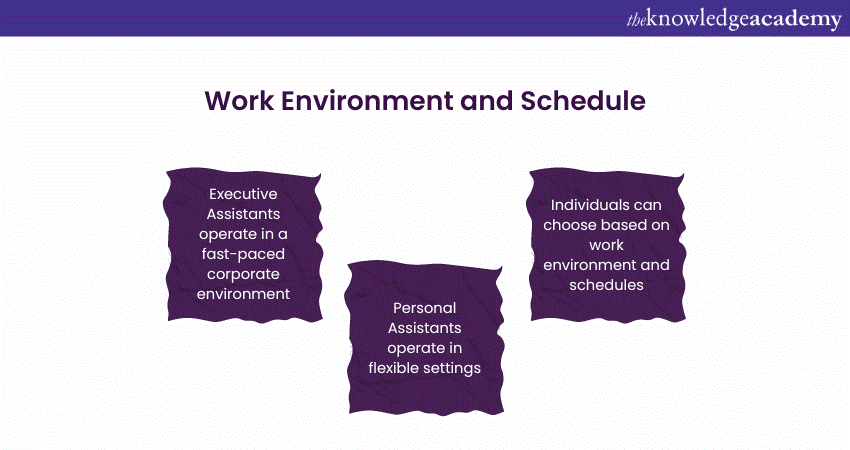
Executive Assistant (EA): Executive Assistants (EA) often work in a fast-paced corporate environment. They may be required to adapt to the unpredictable nature of executive schedules, working long hours and occasionally handling tasks outside standard office hours. The work environment is typically office-based, with the need for effective communication and collaboration with other corporate departments.
Personal Assistant (PA): Personal Assistants (PA) work in various settings, including their employer’s private residences. Their schedules may be more flexible, accommodating the personal needs and preferences of the individual they support.
While some Personal Assistants (PA) work according to their standard office hours, others may find themselves on-call or working irregular hours, especially when managing personal matters that may arise at any time.
The Winner: The choice between an Executive Assistant and a Personal Assistant should align with the preferred work environment and schedule. If the demands of a corporate setting and a structured office schedule are suitable, an Executive Assistants (EA) may be the preferred choice. On the other hand, if flexibility and adaptability to personal needs are essential, a PA may be better suited to the task.
3) Career Development
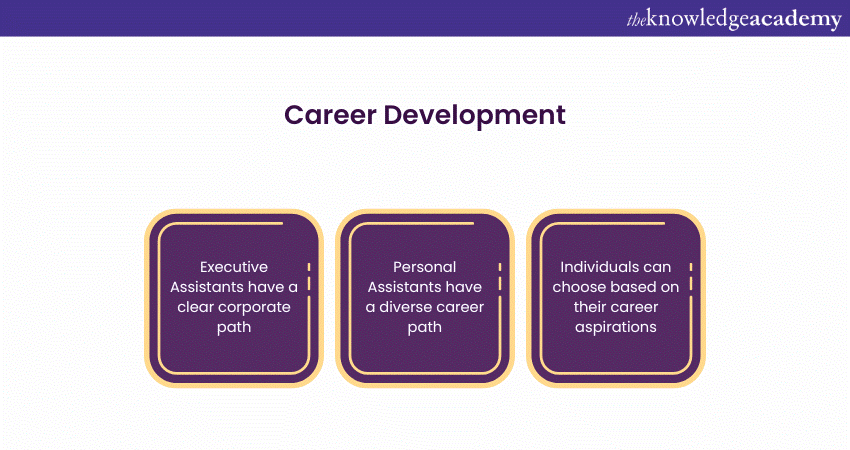
Executive Assistant (EA): Executive Assistant (EAs) often has a clear career path within the corporate world. Their experience in supporting high-level executives provides them with valuable skills in leadership, project management, and strategic thinking. Many EAs may aspire to climb the corporate ladder, taking on roles such as Chief of Staff or other executive positions.
Personal Assistant (PA): Personal Assistant (PAs) may find diverse career paths, depending on the individual's preferences and the nature of the support provided. Some Personal Assistants may transition to roles such as Estate Managers, Family Office Managers, or even pursue entrepreneurial endeavours. The skills gained in managing personal affairs are transferable to various settings beyond the traditional PA role.
The Winner: Individuals seeking a clear corporate career path may find the EA role better aligned with their aspirations. In contrast, those looking for a broader range of career possibilities, including entrepreneurial ventures or management roles in a personal setting, may benefit from the diverse experience gained as a PA.
4) Organisational Culture
Executive Assistant (EA): The organisational culture for Executive Assistant is typically formal, structured, and aligned with corporate norms. They often work within hierarchical structures, collaborating with other departments and executives. Their focus is on professionalism, efficiency, and meeting the strategic goals of the organisation.
Personal Assistant (PA): Personal Assistant may work in a variety of environments, including private residences, family offices, or for high-net-worth individuals. The organisational culture can vary widely, from a more informal and personal atmosphere to a structured and professional setting, depending on the employer's preferences.
The Winner: The choice between the chosen role and the organisational culture is crucial for job satisfaction and success. Individuals should evaluate their preferences and comfort level with the culture of the organisation, whether it is a traditional corporate setting or a more personalised and intimate environment.
Conclusion
In conclusion, understanding the nuances of Executive Assistant vs Personal Assistant is essential for tailored support. Whether navigating the corporate domain or managing personal affairs, the distinct skill sets and responsibilities of each role contribute uniquely to organisational and individual success in today's multifaceted professional horizon.
Manage daily schedules and tasks by signing up for our Office Skills Training now!
Frequently Asked Questions

Yes, an Executive Assistant can become a CEO with the right attitude, motivation, and adaptability. Both CEOs and Executive Assistants believe how their efforts today will benefit them in the future.

No, the Personal Assistant and a secretary are not the same. While both roles involve administrative support, a Personal Assistant manages more personal tasks and has a closer relationship with their employer. Secretaries focus more on professional tasks, such as scheduling, correspondence, and office management.

The Knowledge Academy takes global learning to new heights, offering over 30,000 online courses across 490+ locations in 220 countries. This expansive reach ensures accessibility and convenience for learners worldwide.
Alongside our diverse Online Course Catalogue, encompassing 17 major categories, we go the extra mile by providing a plethora of free educational Online Resources like News updates, Blogs, videos, webinars, and interview questions. Tailoring learning experiences further, professionals can maximise value with customisable Course Bundles of TKA.

The Knowledge Academy’s Knowledge Pass, a prepaid voucher, adds another layer of flexibility, allowing course bookings over a 12-month period. Join us on a journey where education knows no bounds.

The Knowledge Academy offers various PA and Secretarial Course, including Minute Taking Training, and Perfect Executive Personal Assistant Training. These courses cater to different skill levels, providing comprehensive insights into the How to Become a Personal Assistant.
Our Business Skills Blogs cover a range of topics related to PA and Secretarial, offering valuable resources, best practices, and industry insights. Whether you are a beginner or looking to advance your Secretarial skills, The Knowledge Academy's diverse courses and informative blogs have you covered.
Upcoming Business Skills Resources Batches & Dates
Date
 Company Secretary Training Course
Company Secretary Training Course
Fri 24th Jan 2025
Fri 21st Mar 2025
Fri 2nd May 2025
Fri 27th Jun 2025
Fri 29th Aug 2025
Fri 3rd Oct 2025
Fri 5th Dec 2025







 Top Rated Course
Top Rated Course



 If you wish to make any changes to your course, please
If you wish to make any changes to your course, please


